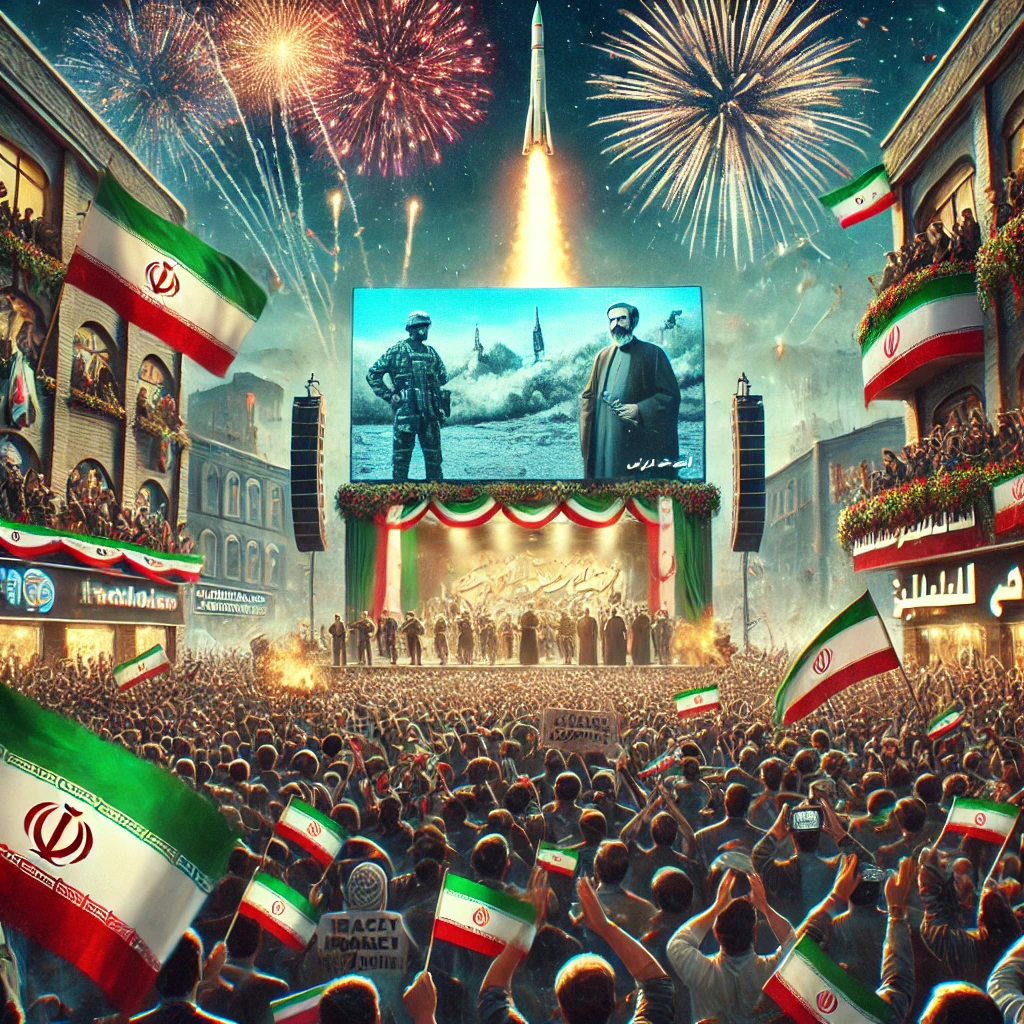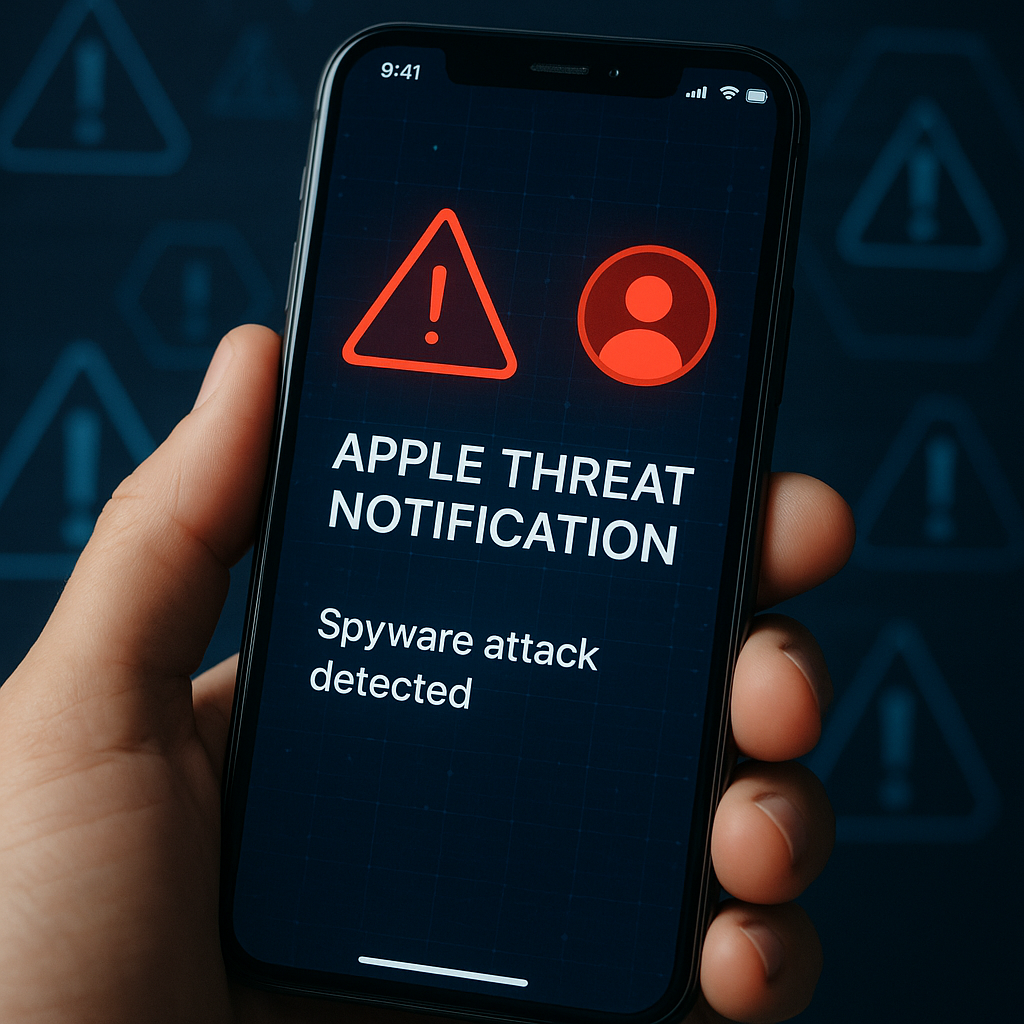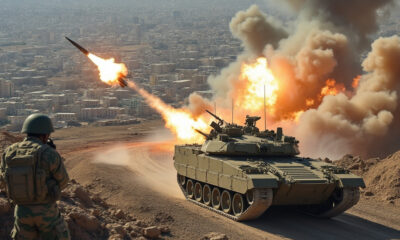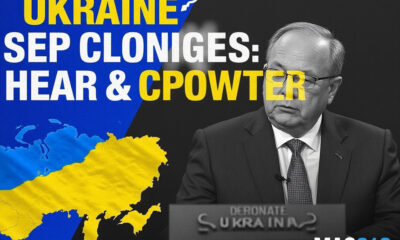International
Celebrations Erupt in Iran Following Missile Attack Against Israel, Highlighting Escalating Regional Tensions

In a development that has added a new layer of tension to the already volatile Middle East, celebrations have erupted across multiple cities in Iran following a large-scale missile attack launched against Israel. This attack, which occurred on October 1, 2024, involved approximately 180 ballistic missiles aimed at various strategic and civilian locations throughout Israel. The missile barrage is seen as a significant retaliation against recent Israeli actions, including airstrikes that killed prominent Hezbollah figures, among them Hassan Nasrallah, the group’s leader.
Public Celebrations Across Iranian Cities
Soon after the missile launch, thousands of Iranians took to the streets to celebrate what many in the country see as a bold response to Israeli actions in the region. The celebratory scenes were reported from cities such as Tehran, Mashhad, Qom, and Isfahan, with crowds chanting slogans like “Death to Israel” and “Victory for Palestine,” underscoring the depth of anti-Israel sentiment among parts of the Iranian population.
In the Iranian capital, Tehran, residents gathered in large numbers in several major squares, waving Iranian flags and carrying posters of Supreme Leader Ayatollah Ali Khamenei. Fireworks lit up the sky, and many chanted slogans in support of the Iranian Revolutionary Guard Corps (IRGC), which has taken responsibility for the missile launch. The streets were filled with vehicles blaring horns, while loudspeakers played nationalistic songs praising Iran’s military might.
In Mashhad, a city considered holy within the country, similar scenes were observed. Clerics were seen delivering speeches in support of the Iranian military actions, framing the missile attack as a righteous response to the perceived aggressions of Israel. Religious symbolism was heavily present during these celebrations, with many viewing the attack as a fulfillment of a duty to protect not only Iranian interests but also those of their allies, particularly Hezbollah and the Palestinian cause.
Iranian Government’s Narrative
The Iranian government has framed the missile attack as a defensive measure, retaliating against recent Israeli operations that resulted in the deaths of multiple Hezbollah leaders in Lebanon, including Hassan Nasrallah. State-run media outlets like Press TV and Fars News Agency were quick to highlight the supposed success of the missile strikes, showing images of the missile launches and footage of celebrations across the country.
Supreme Leader Ayatollah Ali Khamenei made a public statement shortly after the missile attack, declaring, “This is a warning to Israel and its allies—any aggression will be met with a firm and crushing response.” The government’s messaging has focused on portraying the missile attack as a legitimate act of self-defense in light of what they describe as Israeli provocations and continued aggression against the “Axis of Resistance,” which includes Iran, Hezbollah, and various Palestinian factions.
The state-controlled media has also emphasized the effectiveness of the missile strikes, although the exact extent of the damage in Israel has not been fully disclosed by Israeli authorities. The Iranian narrative positions the attack as a victory for Iranian military capability, reinforcing its deterrence against Israeli threats and showcasing the capability of its ballistic missile arsenal.
Response from Israel and the International Community
The missile attack, however, has prompted a swift and stern response from Israel and its allies. Israeli Prime Minister Benjamin Netanyahu condemned the attack, describing it as a “grave mistake” by Iran and warning of severe consequences. Netanyahu addressed the nation, vowing that Israel would “ensure the security of its citizens and retaliate forcefully.” The Israeli Defense Forces (IDF) responded by launching airstrikes against what they described as Iranian military assets and Hezbollah positions in Lebanon.
The United States has also reacted to the escalation. President Joe Biden reiterated American support for Israel’s right to defend itself, while the U.S. Navy deployed additional destroyers equipped with missile defense systems to the eastern Mediterranean to provide further support for Israel’s defense. The U.S. State Department has urged restraint but also condemned the missile attack, stating that it further destabilizes an already fragile region.
Meanwhile, the United Nations has called for immediate de-escalation. A spokesperson for the UN Secretary-General issued a statement expressing deep concern over the potential for the conflict to spiral into a broader regional war, urging all parties to step back from further military actions. UN Special Coordinator for the Middle East Peace Process, Tor Wennesland, has warned that continued hostilities could lead to a situation that is “increasingly difficult to control and has grave consequences for civilians on all sides.”
Impact on Regional Dynamics
The celebrations in Iran following the missile attack underscore the complex dynamics of the Middle East, where nationalism, religious sentiment, and political alliances intersect in deeply rooted conflicts. The outpouring of public support for the missile strike reflects not only the government’s control over public perception through state media but also the genuine anti-Israel sentiment that exists within significant portions of the Iranian population.
This escalation has put Iran’s relationship with other countries in the region under the spotlight. Neighboring Gulf nations such as Saudi Arabia and the United Arab Emirates have historically had strained relations with Iran, primarily due to Tehran’s regional ambitions and its support for proxy groups. These nations are watching the developments closely, as any further escalation between Iran and Israel could have ramifications for their security as well.
Furthermore, the attack and subsequent celebrations have emboldened Hezbollah and other militant groups aligned with Iran. Hezbollah’s acting leader, Naim Qassem, made a statement praising the missile strikes and vowing continued resistance against Israel. The Iranian-backed group, which has significant military capabilities, has been coordinating closely with Iranian officials throughout the recent tensions, and observers fear that Hezbollah could escalate the conflict by launching attacks from Lebanon, further destabilizing the region.
Public Sentiment and Propaganda
The public celebrations following the missile attack also highlight how the Iranian government has effectively used nationalistic propaganda to rally public support. State media channels, along with local clerics and community leaders, have portrayed the missile strikes as a powerful and justified response to Israeli aggression. The public narrative focuses on the idea of “resistance,” with a heavy emphasis on protecting regional allies and defending the integrity of the Muslim world against external threats, particularly from Israel and Western powers.
Televised broadcasts have shown clips of the missiles being launched, accompanied by patriotic music and commentary that glorifies Iran’s military capabilities. Social media channels linked to government and IRGC-aligned groups have been filled with posts celebrating the attack and calling for further action to “liberate Palestine.” This deliberate framing helps maintain public support for Iran’s regional interventions and justifies the significant resources allocated to its missile program and proxy networks across the Middle East.
Potential Repercussions and Future Outlook
The missile attack and subsequent celebrations represent a dangerous escalation that could have far-reaching implications. The most immediate concern is the potential for a broader conflict involving multiple countries across the Middle East. Israel, already involved in active military operations against Hezbollah, may escalate its retaliatory strikes, targeting not only Iranian interests but also proxies across Syria and Lebanon. Such actions could drag other regional players into the fray, increasing the risk of a wider war.
The economic impact of these developments is also significant. Iran is already under heavy international sanctions, which have severely restricted its economy. Continued military actions and further international condemnation could lead to even more stringent economic measures, exacerbating domestic issues such as inflation and unemployment. While the government may succeed in using nationalist sentiment to divert attention from these problems in the short term, the long-term sustainability of such a strategy remains questionable.
For Israel, the attack is likely to lead to increased military spending and potentially more aggressive diplomatic moves to isolate Iran. The Abraham Accords, which normalized relations between Israel and several Arab states, may be further expanded to include deeper security cooperation against perceived threats from Iran. This could lead to a more polarized Middle East, with blocs forming around those aligned against Iran and those supporting it.
In conclusion, the missile attack against Israel and the subsequent celebrations in Iran underscore the fragile state of Middle Eastern geopolitics. With both sides showing little sign of backing down, and with public sentiment in Iran firmly behind the government’s hardline approach, the prospect of a peaceful resolution seems increasingly remote. The international community’s role in mediating and containing the crisis will be critical in the days and weeks to come, as the risk of broader regional conflict looms large.
For further details, you can refer to in-depth coverage on Al Jazeera and BBC News.
business
🇲🇦 King Mohammed VI’s Speech Sparks Heated Debate in Parliament — “جيل زد يُجيب”
Rabat — October 2025
Inside Morocco’s Parliament, tension and reflection filled the air just hours after His Majesty King Mohammed VI delivered his opening-session speech. What was meant as a national roadmap quickly turned into a day of open confrontation, emotional testimonies, and unexpected admissions from members of both majority and opposition blocs.
🏛️ A Speech That Touched Nerves
The King’s address, described by analysts as “direct and reform-oriented,” called for greater social justice, job creation, and balanced development across Morocco’s regions.
“No village left forgotten, no coast without a hand,” the King declared — a message that resonated deeply with citizens and lawmakers alike.
Within hours, parliamentary corridors buzzed with interviews, arguments, and introspection. Some MPs hailed the speech as “a moral reset,” while others questioned whether the government was capable of turning royal vision into tangible results.
🧠 From Rabat to the Sahara — Gen Z Responds
Younger members of Parliament — labeled as جيل زد (Gen Z) — became the focus of cameras and public curiosity. Many expressed frustration at what they see as a widening gap between political promises and everyday realities faced by Moroccan youth.
“The King spoke about unity and work. We agree — but the youth need a chance to prove themselves,” said one 28-year-old deputy.
“We have the energy; the system just needs to open its doors.”
Another young MP caused a social-media storm after saying that “in some ways, Moroccan social values are stronger than Germany’s.”
Critics accused him of downplaying Europe’s economic strength, while others applauded his pride in Moroccan family cohesion.
He later clarified his words, emphasizing that every nation faces challenges — and that Morocco’s real wealth lies in its people.
💬 Resignation, Reflection, and Responsibility
Just a week earlier, one deputy had submitted his resignation in protest over what he called “a lack of listening to the new generation.”
After the King’s address, he withdrew it.
“The royal speech gave me renewed hope. This is not the time to quit — it’s time to work,” he told reporters.
Across party lines, both RNI and PAM youth wings echoed similar messages: commitment to reform, but also impatience with bureaucracy.
Several MPs criticized ministers who, they said, “do not answer calls, do not reply to written questions, and have lost touch with citizens.”
⚖️ Opposition Voices: ‘A Government in Denial’
Members of the opposition used the session to accuse the cabinet of denial and poor communication, arguing that ministers are “living in a different reality” from citizens struggling with prices and unemployment.
“The royal messages were clear,” said one opposition leader. “The problem is not the King’s vision — it’s implementation.”
🌍 Morocco’s Path Forward
Analysts note that the King’s address aligned with long-standing themes: national cohesion, balanced territorial development, and respect for dignity in public service.
But the 2025 context — economic pressure, youth disillusionment, and the digital activism of Gen Z — gives these calls new urgency.
“This generation communicates differently,” said a policy researcher. “If institutions don’t adapt, they’ll lose credibility.”
🕊️ A Message Beyond Politics
As the parliamentary session ended, one young MP summed up the mood:
“الملك تكلّم… ونحن سنُجيب بالعمل — The King spoke, and we will answer through action.”
For now, the chamber that often echoes with partisan debates found itself united — briefly — under a single message:
Morocco’s future belongs to its youth, but responsibility belongs to everyone.
data breaches
Manufacturing Software at Risk from CVE-2025-5086 Exploit

Dassault Systèmes patches severe vulnerability in Apriso manufacturing software that could let attackers bypass authentication and compromise factories worldwide.
A newly disclosed flaw, tracked as CVE-2025-5086, poses a major security risk to manufacturers using Dassault Systèmes’ DELMIA Apriso platform. The bug could allow unauthenticated attackers to seize control of production environments, prompting urgent patching from the vendor and warnings from cybersecurity experts.
A critical vulnerability in DELMIA Apriso, a manufacturing execution system used by global industries, could let hackers bypass authentication and gain full access to sensitive production data, according to a security advisory published this week.
Dassault Systèmes confirmed the flaw, designated CVE-2025-5086, affects multiple versions of Apriso and scored 9.8 on the CVSS scale, placing it in the “critical” category. Researchers said the issue stems from improper authentication handling that allows remote attackers to execute privileged actions without valid credentials.
The company has released security updates and urged immediate deployment, warning that unpatched systems could become prime targets for industrial espionage or sabotage. The flaw is particularly alarming because Apriso integrates with enterprise resource planning (ERP), supply chain, and industrial control systems, giving attackers a potential foothold in critical infrastructure.
- “This is the kind of vulnerability that keeps CISOs awake at night,” said Maria Lopez, industrial cybersecurity analyst at Kaspersky ICS CERT. “If exploited, it could shut down production lines or manipulate output, creating enormous financial and safety risks.”
- “Manufacturing software has historically lagged behind IT security practices, making these flaws highly attractive to threat actors,” noted James Patel, senior researcher at SANS Institute.
- El Mostafa Ouchen, cybersecurity author, told MAG212News: “This case shows why manufacturing execution systems must adopt zero-trust principles. Attackers know that compromising production software can ripple across supply chains and economies.”
- “We are actively working with customers and partners to ensure systems are secured,” Dassault Systèmes said in a statement. “Patches and mitigations have been released, and we strongly recommend immediate updates.”
Technical Analysis
The flaw resides in Apriso’s authentication module. Improper input validation in login requests allows attackers to bypass session verification, enabling arbitrary code execution with administrative privileges. Successful exploitation could:
- Access or modify production databases.
- Inject malicious instructions into factory automation workflows.
- Escalate attacks into connected ERP and PLM systems.
Mitigations include applying vendor patches, segmenting Apriso servers from external networks, enforcing MFA on supporting infrastructure, and monitoring for abnormal authentication attempts.
Impact & Response
Organizations in automotive, aerospace, and logistics sectors are particularly exposed. Exploited at scale, the vulnerability could cause production delays, supply chain disruptions, and theft of intellectual property. Security teams are advised to scan their environments, apply updates, and coordinate incident response planning.
Background
This disclosure follows a string of high-severity flaws in industrial and operational technology (OT) software, including vulnerabilities in Siemens’ TIA Portal and Rockwell Automation controllers. Experts warn that adversaries—ranging from ransomware gangs to state-sponsored groups—are increasingly focusing on OT targets due to their high-value disruption potential.
Conclusion
The CVE-2025-5086 flaw underscores the urgency for manufacturers to prioritize cybersecurity in factory software. As digital transformation accelerates, securing industrial platforms like Apriso will be critical to ensuring business continuity and protecting global supply chains.
data breaches
Spyware Surge: Apple Sends Fourth Security Alert to French Users

CERT-FR and Apple warn of sophisticated spyware targeting iCloud-linked devices via zero-click exploits; high-profile individuals at risk.
Apple and France’s CERT-FR have issued a fourth spyware notification in 2025, alerting users to potential compromise of iCloud-linked devices through highly sophisticated zero-click attacks. Targets include journalists, activists, politicians, and officials. Authorities urge urgent updates, lockdown measures, and enhanced defenses amid rising mercenary spyware risks.
PARIS — Apple has issued its fourth notification of the year to French users, warning that at least one device linked to their iCloud account could have been compromised in a sophisticated spyware campaign, authorities confirmed Friday.
- On September 3, 2025, Apple alerted users in France via iMessage, email, and iCloud notifications that their devices may have been targeted by spyware. The Hacker News+1
- This marks the fourth such advisory this year, with prior alerts issued on March 5, April 29, and June 25. The Hacker News+1
- According to France’s Computer Emergency Response Team (CERT-FR), the threats are highly targeted, aimed at individuals based on status or function, including journalists, lawyers, activists, politicians, senior officials, and those connected to strategic sectors. The Hacker News+1
- CERT-FR clarified: “Receiving a notification means that at least one of the devices linked to the iCloud account has been targeted and is potentially compromised.” Dark Reading
- The alerts often arrive several months after compromise attempts, and the time lag is variable. Dark Reading
- Known spyware implicated in similar campaigns includes Pegasus, Predator, Graphite, and Triangulation—tools described by CERT-FR as “particularly sophisticated and difficult to detect.” Dark Reading+1
Historical or Geopolitical Context:
- CERT-FR has been issuing these notifications since November 2021 but has intensified alerts in 2025 with four documented campaigns in France alone. The Hacker News+1
- Globally, mercenary spyware campaigns against civil society figures and officials have drawn scrutiny for their use of zero-click and zero-day vulnerabilities. TechRadar+1
- CERT-FR (France’s national cybersecurity agency): “Receiving a notification means that at least one of the devices linked to the iCloud account has been targeted and is potentially compromised.” Dark Reading
- Security researcher interviewed by Dark Reading (paraphrased): “Spyware programs like Pegasus, Predator, Graphite, and Triangulation are particularly sophisticated and difficult to detect.” Dark Reading
- El Mostafa Ouchen, international cybersecurity adviser and author, added: “This pattern of repeated, stealthy attacks underscores the importance of proactive device defenses. When high-profile individuals are targeted, detection must coincide with rapid response protocols—regular updates, lockdown modes, and separation of sensitive from general-use environments aren’t optional; they’re essential.”
Technical Analysis
How the Incident Occurred & Possible Attack Vectors:
- The attacks largely exploit zero-click vulnerabilities, which allow spyware to be delivered and activated on a device without any interaction from the user. Dark Reading
- Zero-day flaws—previously unknown and unpatched security vulnerabilities—are used as entry points, including flaws in the ImageIO framework (e.g., CVE-2025-43300) and WebKit. Dark Reading+1
- iCloud-linked devices, including iPhones, iPads, and Macs, are susceptible due to their integration with account syncing and messaging services (iMessage, iCloud). TechRadar+1
Affected Systems:
- Devices tied to impacted Apple IDs—even those not actively in use—may be exposed if they remain connected via iCloud.
- Alerts are triggered when Apple identifies indicators of compromise tied to known spyware chains.
Mitigations and Remediations:
- Users are urged to update their devices immediately, enabling automatic updates to ensure timely patching of zero-day vulnerabilities. Dark Reading
- CERT-FR recommends enabling Lockdown Mode, a feature that restricts many device functionalities to mitigate spyware risk. Dark Reading
- Regular device restarts also aid detection and disrupt latent malware activity. Dark Reading
Impact & Respons
Who Is Affected:
- Individuals in France (and possibly elsewhere) whose devices are linked to compromised Apple IDs, spanning prominent roles in journalism, politics, law, and activism. The Hacker News+1
Actions Taken:
- Apple is dispatching notifications and sending alerts via email, iMessage, and iCloud logins.
- CERT-FR has issued official advisories and security guidance.
- Apple patched at least seven zero-day vulnerabilities this year, including those in ImageIO and WebKit. TechRadar
Possible Long-Term Implications:
- Continued exploitation of zero-click spyware may accelerate regulatory pressure on mercenary spyware firms and drive policy changes.
- Public trust in mobile device security may erode unless transparency and mitigation improve.
- Surveillance of high-profile individuals raises concerns about privacy, democratic integrity, and misuse of advanced spyware.
- France is among several countries where Apple has stepped up threat notifications tied to sophisticated spyware campaigns.
- The use of mercenary spyware—commercially sold surveillance tools used by governments, including NSO Group’s Pegasus—has been a global concern over the past several years.
- Zero-click attacks have been notably difficult to detect, and have been implicated in espionage of journalists, dissidents, and government officials in multiple regions.
The revelation that Apple users in France are now facing a fourth spyware alert in 2025 signals an escalation in stealthy, targeted cyber intrusions. As attackers rely on elusive zero-click and zero-day exploits, rapid technological and policy responses are essential. Continued vigilance, device hygiene, and legislative action may be needed to shield democracy’s key voices from such pervasive threats.
















